Travel is a funny thing. You go somewhere, snap a few photos, eat some food, and take off. Maybe you return to your destination another time, ensure your memories were as fond as they are in your mind; maybe you’re satisfied with just posting your vacation pics to Facebook/Twitter/Google; or maybe you even write about your experience for the world to see. But that’s it. It’s over. It’s something to talk about at social gatherings and perhaps a way to collect trinkets for your desk, but the few days you spend
abroad/a few miles from home/returning to your native country, and suddenly you’re back in real life.
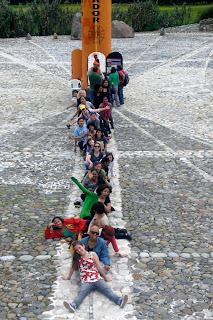 |
On the Equator!
This past winter break I traveled. A lot. I spent the first ten days in Puerto Rico, where I learned that even Taco Bell, Subway, Pizza Hut, and Burger King dominate this semi-exotic location, that Puerto Rican Spanish is unlike any other dialect in the world, and one should appreciate the sun on a beach vacation, as reading trashy novels on your kindle inside the hotel lobby just doesn’t offer the same experience as lying on the precious sand would. I also learned how rum is made, perhaps a valuable skill for my future career as a pirate. |
New Year’s eve was spent with some of my precious
Culties, sipping cider, ecstatically belting karaoke, and staying up into the wee hours of the morning reminiscing on the past 20 years of our lives together. I enjoyed New Year’s brunch with my grandparents and before I knew it I was off again on a flight to JFK.
 |
Culties bringing in the New Year.
From JFK I departed to Guayaquil, Ecuador, accompanied by a lovely group of twenty-three other women selected to participate in the international women’s leadership trip in which I was about to embark. We arrived in Quito twelve hours after leaving New York, shocked by the free open bar on the plane to enhance the joys of watching one terrible Jenifer Aniston movie after another, and even more stunned by the insanely low food prices at the airport. I kid you not: Cheap food- at an airport! We knew we were in for something special. |
 |
| Planting trees in the Paramo, an extraterrestrial hot spot. |
We arrived at the
Hacienda Picalqui just after lunchtime. We were served a feast of fresh tomato soup with popcorn to toss in, hot rice with vegetables, fresh salad, and pineapple juice. For the ten days we stayed there, the three women in the kitchen, assisted by Gabriel, the toddler constantly stealing an enormous bread knife, causing a threat to the knees of our beloved chefs, never failed to cook us a delicious meal. We were constantly overwhelmed by the abundance of delicious vegetable soups, fresh breads, a little too much rice and potatoes, and even pasta!
 |
| Well-fed ladies exploring Ecuador... |
Our first full day on the hacienda was spent in the fields, pulling weeds from carrot, radish, onion, potato, and various other crops. City girls who only had one definition of ho learned what it meant to de-weed columns upon columns of dirt (note my highly technical terms), to discover egg sacks from worms and spiders, and compost the leftovers from our labors.
 |
| Hard at work! |
|
Throughout the week, we toured local organic farms, learning the ease with which these Ecuadorians create sustainability in their communities and reinforcing the ways in which factory farming is so detrimental to our capitalist society. While I’ve been on eating sprees before, usually after reading a Michael Pollan book, I finally saw- and felt- what it meant to live organically, and I vowed to eat more organic foods back in New York, a promise I’m still maintaining, although the noticeable price difference remains evident in my bank account… |
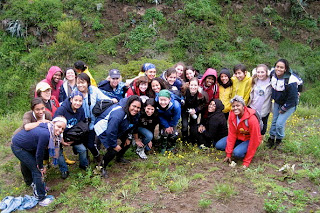 |
| Recovering after a steep hike! |
Every moment in Ecuador proved equally challenging and inspirational. We worked in the fields, met with female leaders throughout the province, visited Plaza de Ponchos, and hiked incredibly long distances at unimaginably high altitudes. We played with children in schools, drank tin cups of
aguardiente (fermented beverage made from agave, supposedly a drink of the Gods although it tastes more like dirty dish water) offered to us, and graciously accepted plates of food prepared by locals, never wasting even a kernel of corn, as we saw the intense labor necessary into producing each and every crop.
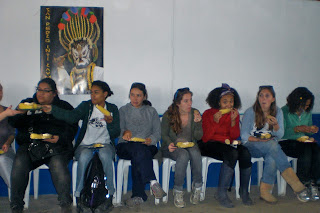 |
| Two ears of corn, two potatoes, cheese... just a snack, right? |
 |
| A girl at an infant center we visited. |
Maria, a woman who had once worked in the
rose plantations and went on to create a co-op for women affected by the damages caused by this industry, stood out to me. Her eyes filled with tears as she explained that she missed the childhood of her two kids, as she worked from daybreak to well after midnight, and even longer before American celebrations like Valentine’s Day and Mother’s Day. The workers suffer from horrible health as they inhale the pesticides used in the plantations and even have dark stained mouths from the toxins, preventing them from finding better work elsewhere due to discrimination. If the workers protest or demand better conditions, they get fired, as someone else will always be waiting for work for the unfairly low wages. I sat there listening, incredulous at who could possibly be so greedy as to force these people into such horrendous lifestyles. And while I have been deterred from buying roses ever again- unless they’re organic!- our team is diligently working on solutions for this problem, starting first and foremost by sharing what we witnessed in South America.
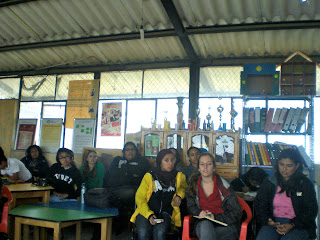 |
| Maria, far right, telling her story. |
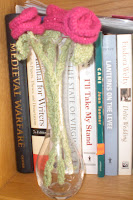 |
Knitted roses, a safe alternative!
Our service trip was interrupted for a two-day vacation to Intag, where we bathed in hot springs, loaded up on sixty-cent ice cream cones, and drove through treacherous mudslides, terrified that we would never see the comfort of the hacienda again. Our last day in Intag, we took a hike past the longest Zipline in South America, and learned that for a mere five dollars, we could enjoy the experience of a lifetime. It seemed a little risky. It also seemed kind of awesome. I’ve been ziplining before, in Puerto Vallarta, but it was much more expensive and seemed much less dangerous. And while I was slightly terrified to fly hundreds of feet above a deathly river- under no circumstance were we allowed to even touch the river behind our cabins due to the undertow- I was more terrified at missing out on the experience. For fifty seconds, I zipped through the air, taking in the breathtaking sights surrounding me, and elating in the experience of freedom. And finally on the other side I realized that perhaps FDR really knew what he was talking about, and by embracing my fear, not running away from it, I actually found so much happiness. |
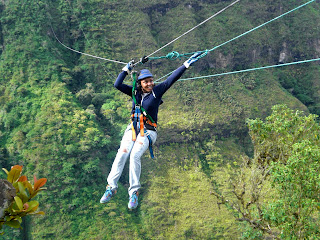
I could go on and on about the lessons and memorable experiences from Ecuador. And while they may certainly pop up here again, I’ll keep it short. Well, as short as I can make this. Journaling in Ecuador made me realize that the work I did, the sights I saw, the people with whom I interacted would not be forgotten, that I had a permanent memory of my impressions and my inspirations, and while I remain clueless as to when I will return to South America, if ever again, I can understand how much I gained from my ten days there in January, and how much I can use these experiences to better connect with the world around me.
 |
| Stopping for a snack of bizcochos and dulce de leche. |



